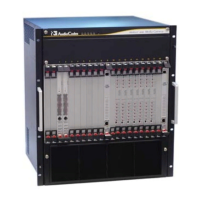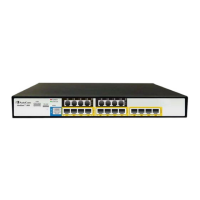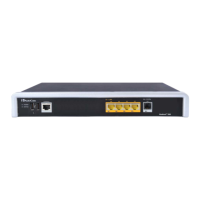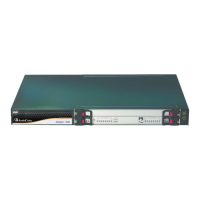Version 7.2 521 Mediant 800B Gateway & E-SBC
User's Manual 23. Trunk Groups
Parameter Description
Trunk Group, in ascending cyclic order is selected. After the
device reaches the highest channel number in the Trunk Group, it
selects the lowest channel number in the Trunk Group, and then
starts ascending again.
[2] Always Ascending = The lowest available channel in the Trunk
Group is selected, and if unavailable, the next higher channel is
selected.
[3] Cyclic Descending = The next available channel in descending
cyclic order is selected. The next lower channel number in the
Trunk Group is always selected. When the device reaches the
lowest channel number in the Trunk Group, it selects the highest
channel number in the Trunk Group, and then starts descending
again.
[4] Always Descending = The highest available channel in the
Trunk Group is selected, and if unavailable, the next lower
channel is selected.
[5] Dest Number & Cyclic Ascending = The channel is selected
according to the called number. If the called number isn't found,
the next available channel in ascending cyclic order is selected.
Note: If the called number is located, but the port associated with
the number is busy, the call is released.
[6] By Source
Phone Number = The channel is selected according
to the calling number.
[7] Trunk Cyclic Ascending = The channel from the first channel of
the next trunk (adjacent to the trunk from which the previous
channel was selected) is selected. (Applicable only to digital
interfaces.)
[8] Trunk & Channel Cyclic Ascending = The device implements
the Trunk Cyclic Ascending and Cyclic Ascending methods to
select the channel. This method selects the next physical trunk in
the Trunk Group, and then selects the B-channel of this trunk
according to the Cyclic Ascending method (i.e., selects the
channel after the last allocated channel). (Applicable only to digital
interfaces.)
For example, if the Trunk Group includes two physical trunks, 0
and 1:
For the first incoming call, the first channel of Trunk 0 is
selected.
For the second incoming call, the first channel of Trunk 1 is
selected.
For the third incoming call, the second channel of Trunk 0 is
selected.
[9] Ring to Hunt Group = The device allocates IP-to-Tel calls to all
the FXS ports (channels) in the Hunt Group (i.e., a ringing group).
When a call is received for the Hunt Group, all telephones
connected to the FXS ports belonging to the Hunt Group start
ringing. The call is eventually received by whichever telephone
first answers the call (after which the other phones stop ringing).
This option is applicable only to FXS interfaces.
[10] Select Trunk by Supp-Serv Table = The BRI port/module is
selected according to the settings in the Supplementary Services
table (see Configuring Multi-Line Extensions and Supplementary
Services on page 618), allowing the routing of IP-to-Tel calls to

